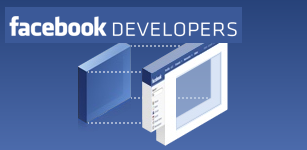
Today Facebook presented a 6-month developer roadmap. Finally - it's been frustrating as hell writing a book about Facebook and not knowing what was coming from them and when, not to mention staying abreast of all the changes for our clients. In their presentation Facebook said that there were not many or big changes being announced, but I beg to differ. Some of them are quite significant. I'll be covering those changes over the coming weeks and how they will affect your business, personal, and application presences on Facebook. What's great is that Facebook is actually giving developers a heads-up for the next six months, and making that information public to all. That's fantastic. If only I had this before I started writing the book.
Let's get to the meat of it.
What's chopped? What's not? The first big change, for both developers and users, center around the Facebook Stream and communication channels. Facebook is offering a new one, which is big news, and taking away some old ones, which is, perhaps, bigger news...
The Stream
Notifications are dead. Both application-to-user and user-to-user. At least the way they work today. Ouch.
For those applications or companies that depend on these for growth this is a blow. What are notifications? They are the little lightweight messages that pop up in the Facebook user interface to let you know of some event happening in an application. They can be sent currently by applications on behalf of their users to their friends or other application users (in the case of user-to-user notifications) or from an application to its users directly (for application-to-user ones.) Facebook collects the recent ones in the bottom right of the Facebook window( usually filled with messages from Facebook, Living Social, or Mafia Wars.) All user-to-user notifications will be routed to the Inbox; however, there will be no way for applications to send anything on behalf of their users anymore without their consent. Invitations/requests will also be routed 'somewhere' into the Inbox. Which is fine since I cannot remember the last time time I have even looked at my requests. When they hit the 300-or-so mark I simply delete them all. Those are all being routed to the Inbox in the near future.
Why kill notifications, one of the only ways left for apps to communicate with users without their consent? Simply put, they don't work, except in very specific circumstances. Most of the time they are noise. A LOT of noise. Additionally, most people have no clue they even exist or where they live. Currently users have to keep track of five different communication channels in Facebook: invites/requests, messages (Facebook Inbox today), notifications, Feed stories (the stuff on your Wall and News Feed), and IM/Chat. They say it's too much and no one is clear where to look for them. They're right.
So basically one-to-one communications of all types Facebook wants to route to the Inbox: one spot for users to check messages targeted directly at them. Makes sense. Unclear how/if Chat will be affected if at all.
One-to-many communications will be handled solely by the Stream in the form of Feed stories published via the Open Stream API. And the automatically-published one-line stores that applications can publish to your Recent Activity section on your Wall? Also gone.
Honestly I think this is a great thing for users and for applications. Why? Because now more than ever developers and content providers are going to have to think about engagement first, before features, before copying the other guy, before writing a line of code. The only way for apps to really spread through the Stream is for users to interact with the stories that applications post there - meaning stories that application users *allow* them to post to begin with - either via the Like or Comment features.
The other big news on the communcation front is that Facebook will provide a means for developers to prompt their users for, and grant the right to store users' real e-mail addresses. Also the right to store their first and last names most likely, though at the time of this post the details have not been hashed out. You heard that right. Facebook will allow applications to contact users directly without having to use Facebook as the intermediary. This is HUGE. And a huge boon for Facebook Connect developers for sure.
What do you think?
UI Changes : Dashboards, Counters, and the Death of the Profile Box
Facebook is changing the look and feel of the Home Page, at least. A long, narrow bar will contain entries very similar to the way the Facebook Application menu looks today. It will contain the friend lists like it does today but will also incorporate Bookmarks. And they're finally giving developers an FBML <fb:bookmark/> tag so they don't have to jump through hoops to get users to do so. Finally. They are also introducing UI menus they call 'Dashboards' that originally will be of two types: Applications and Games. Recommendations might make the cut as well. These are all in early mock-up stages but will potentially be easier ways for users to find new apps and games. There are no distinctions at this time between them.
To allow users to see when applications have notified them of something they need to act on - the way notifications do today - Facebook is introducing Counters to the right of bookmarked (only?) applications in this new UI bar. You can see them in the image to the right. Counters show the number of things 'you need to deal with' in the item their associated with. Presumably this would be user-to-user or application-to-user messages in the Inbox, for example.
The Facebook chrome is going to change (again) as well - new top nav, cleaner layout.
And oh the poor Boxes tab is finally meeting its maker. As developers we called it 'Siberia'. If an app had a presence there its engagement was dismal, so this should be of no big surprise to anyone. One other interesting change is the change to profile or application tabs - they are going to be given much less real estate width-wise. I assume this is to compensate for the new left nav idiom? Anwyay they are going from 760->560 pixels in width.
Ethan hinted at some other (seemingly very significant) changes to the Profile page as well. They want to allow more sharing of content that makes your Profile more unique. That's great - right now everyone's looks identical except for the profile pic and potentially the one application profile box below the friends widget. They could not elaborate on these changes but suggested that they would involve some work for developers.
Platform Policies and Programs
Highlights here included an entirely new Facebook Developer site with completely rewritten Platform documentation, more social features focused on community. That's great: the existing wiki is weak at best, pathetic at worst. Many of the most important pages became woefully outdated yet were locked from public editing (<cough>FBJS</cough>). They will be providing comprehensive how-to guides and walkthroughs and will also provide all the content they covered in the demo today. One other interesting thing is that they will be providing a 'Health of the Platform' section that will show how all (?!) the APIs are currently working in the wild and the current top bugs they are working on fixing, and those they expect you to work around. This will undoubtedly lessen the massive forum threads that alternate between 'it works' and 'it doesn't' posts.
The gargantuan 14-page opus that comprises the Facebook Platform policies have been shrunk to 3. With screenshots showing best practices and examples of flagrant violations of policy. Fantastic!
Application and Page Insights will be updated and accessible through APIs. Darn, just about finished the app to scrape them dynamically.
Open Graph API
This is the next evolution of Facebook Connect it sounds like. Basically it was pitched as a way for 'any web page' to become a Facebook Fan Page/Public Profile through the use of what I assume are custom widgets or code in the Facebook Connect or Facebook JavaScript Client Libraries.
For example, let's say as a brand I don't want a Facebook Page. I've spent a lot of time cultivating an audience on an external site that I control and don't want to fragment them by investing in a Facebook presence as well. The Open Graph API will allow me to add Facebook widgets and access their entire API allowing my users to become Fans of my EXTERNAL page - and have that show up on their Profiles WITHIN Facebook. These external pages will also show up in Facebook Search from within Facebook, just like they were Pages within the site. Developers will be able to publish Streams targeted directly at these Fans on the external site(s) that use the API. This will undoubtedly be an interesting area of development in the coming months. Along with direct email communication this will probably jolt Facebook Connect implementations into the stratosphere.
Questions Asked By the Audience
Some of these were very good so I've included them to the best of my knowledge:
Q: As part of it's new interactive developer site is Facebook going to give developers a 'vote' on features for Facebook to add?
A: Um, no.
Q: What's up with Facebook's currency system? Any news?
A: Facebook credits (used in past to purchase Facebook Gifts) are still in use, but they have no 'real' announcements. They are testing whether or not to allow developers to use or accept them as currency in their apps but that's about it for now.
Q: How are apps going to prompt for user email addresses? Extended permissions are painful today.
A: They know, they are going to collapse them into a fewer number of them that allow users and developers a more clear view of how they work and what they grant.
Q: Will counters only show up for bookmarked applications?
A: Yes
Q: Will 'Publish to a Friend's Wall' still work?
A: Not been addressed; only changes they've made to the Stream have been the Open Stream API and that's just been a week ago - no changes planned.
Q: Is Facebook killing the verified applications program altogether?
A: Yes! They are going to spend a lot of time and expense making sure ALL applications are up to the same level of quality as verified ones were.
Q: Any idea in the new Stream of which messages will get more visibility or prioritization (popularity?)
A: Likes and Comments are key - make sure that people want to Comment and Like them. This will ensure their spread. He was unsure of how this affects search rankings within Facebook search.
That's about it, in a nutshell.
Thoughts? Questions?
Tags:
Social Media NewsOct 28, 2009


